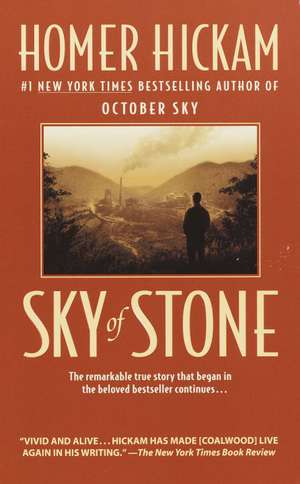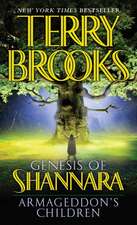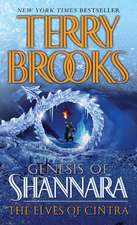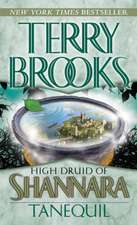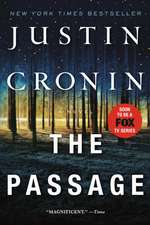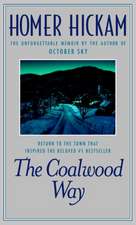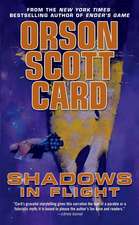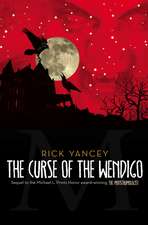Sky of Stone: A Memoir: Coalwood
Autor Homer H. Hickamen Limba Engleză Paperback – 30 sep 2002 – vârsta de la 14 până la 18 ani
Now Homer Hickam continues his extraordinary story with Sky of Stone, dazzling us with exquisite storytelling as he takes us back to that remarkable small town we first came to know and love in October Sky.
In the summer of ‘61, Homer “Sonny” Hickam, a year of college behind him, was dreaming of sandy beaches and rocket ships. But before Sonny could reach the seaside fixer-upper where his mother was spending the summer, a telephone call sends him back to the place he thought he had escaped, the gritty coal-mining town of Coalwood, West Virginia. There, Sonny’s father, the mine’s superintendent, has been accused of negligence in a man’s death—and the townspeople are in conflict over the future of the town.
Sonny’s mother, Elsie, has commanded her son to spend the summer in Coalwood to support his father. But within hours, Sonny realizes two things: His father, always cool and distant with his second son, doesn’t want him there ... and his parents’ marriage has begun to unravel. For Sonny, so begins a summer of discovery—of love, betrayal, and most of all, of a brooding mystery that threatens to destroy his father and his town.
Cut off from his college funds by his father, Sonny finds himself doing the unimaginable: taking a job as a “track-laying man,” the toughest in the mine. Moving out to live among the miners, Sonny is soon dazzled by a beautiful older woman who wants to be the mine’s first female engineer.
And as the days of summer grow shorter, Sonny finds himself changing in surprising ways, taking the first real steps toward adulthood. But it’s a journey he can make only by peering into the mysterious heart of Coalwood itself, and most of all, by unraveling the story of a man’s death and a father’s secret.
In Sky of Stone, Homer Hickam looks down the corridors of his past with love, humor, and forgiveness, brilliantly evoking a close-knit community where everyone knows everything about each other’s lives—except the things that matter most. Sky of Stone is a memoir that reads like a novel, mesmerizing us with rich language, narrative drive, and sheer storytelling genius.
Preț: 55.81 lei
Nou
Puncte Express: 84
Preț estimativ în valută:
10.68€ • 11.07$ • 8.91£
10.68€ • 11.07$ • 8.91£
Carte disponibilă
Livrare economică 28 februarie-14 martie
Preluare comenzi: 021 569.72.76
Specificații
Notă biografică
Homer H. Hickam, Jr., was born and raised in Coalwood, West Virginia. The author of Torpedo Junction, a Military History Book of the Month Club selection, as well as numerous articles for such publications as Smithsonian Air and Space and American History Illustrated, he is a NASA payload training manager for the International Space Program and lives in Huntsville, Alabama.
Extras
The Coalwood Proposition
When once the president of the United States called his nation to greatness, and told the world we were going to the moon, Coalwood, West Virginia, remained what it had always been, a town that mined coal. When President Kennedy also said Americans were going to do many grand and wonderful things, not because they were easy but because they were hard, Coalwood’s men continued to walk out of fog-shrouded hollows and descend beneath their mountains to grub out the coal by the millions of tons to send to the blast furnaces of Ohio and Pennsylvania so as to make steel. For if coal failed, the people of Coalwood believed, steel failed. And if steel failed, so did the country, no matter what else might happen, even with a young president’s dream of glory on the moon.
I was born in 1943 and raised a Coalwood boy, the second son of Homer Hickam, a mine foreman who loved the town more than his life, and Elsie Lavender, a woman who could not love Coalwood no matter how hard she tried. Although my given name was the same as my father’s, my mother tagged me early on with “Sunny” — the light of her life. Believing it was more important for me to know who I was rather than what my mother hoped I might be, my first-grade teacher at the Coalwood School changed the spelling to “Sonny” — the son of Homer. Although she didn’t like it, my mom chose not to argue. In Coalwood, the teachers were considered the final social arbiters.
During my childhood, I came to understand that Coalwood was more than houses, roads, and company facilities. It was also a proposition. This proposition held that if a man was willing to come to Coalwood and offer his complete and utter loyalty to the coal company, he would receive in return a sensible paycheck, a sturdy house resistant to the weather, the services of a doctor and a dentist at little or no cost, and a preacher who could be counted on to give a reasonably uncomplicated sermon. Mr. George Lafayette Carter, the man who founded Coalwood and built its mine, also opened his wallet to the local schools. He did so, according to a letter he wrote to his men in 1912, “so that any of Coalwood’s children, be they sons and daughters of foremen or common miners, might aspire to greatness.”
In 1926, a newspaper reporter from New York City, having heard of Mr. Carter’s proposition, visited Coalwood and filed this copy:
Mr. Carter owns lock, stock and barrel the model coal town of Coalwood — houses, stores, churches, police, clergy, and medical services — all that makes up the life of a miner. It is a town of remarkable contrast to the surrounding villages where squalor and poverty are their world. With houses painted and surrounded by flower gardens and lawns, Coalwood looks more like an Alpine Village than the begrimed coal towns of most of America.
The proposition depended on everybody following Mr. Carter’s rules. They were few, unwritten, and unbreakable. One of them had to do with what happened to a miner’s family when he was killed. I first observed it in practice when I was six years old and in the second grade of the Coalwood School.
We were reading from a book titled The Wind in the Willows, a tale of a toad who could drive an automobile. I liked the book, mostly because the toad was smart and used a lot of big words. I think all of my fellow classmates wished we might also grow up and be as smart as that toad, even though he kept wrecking his car. Mr. Toad was just about to wreck it again, when Mr. Likens, the school principal, came to collect one of my classmates, a boy named Lonnie Huddle. Lonnie didn’t want to go with Mr. Likens. I think he could see in the principal’s face that something awful had happened. Lonnie started to cry, and pretty soon nearly every girl in class joined him. I watched Lonnie go, certain that because he had cried, he was going to get knocked around by the other boys at recess for being a sister. But the day ended without Lonnie’s return.
That evening, as my family gathered around the kitchen table for supper, Dad announced that Lonnie’s father had been killed in the mine. After giving my mother a furtive eye rewarded by a subtle nod of her head, he explained to me and my brother, Jim, that the company gave a widow of a deceased miner two weeks to make arrangements to get her husband buried and her family out of town. Her children, however, were not allowed back into the Coalwood School. These were the rules, he added, and that was all there was to it.
“Lonnie won’t come back?” I asked. I couldn’t imagine recess without him.
“Lonnie won’t come back,” Dad said, and went back to cutting up the ham Mom had slapped on his plate. Our conversation, such as it was, was over.
Before I went to bed that night, my mother suggested that I make up a prayer for Lonnie and his mother and his brother and two sisters. “He’s gone, Sonny,” she said after I said how much I liked playing tag with Lonnie and what a good reader he was in class. “It’s the way of this place. Get used to it. God knows I have.”
“But he’s just down the street! I could go see him, tell him how sorry I am about his daddy.”
“It isn’t allowed,” she said coldly. “He’s cut off. You know about being cut off, don’t you?”
I did. I had grown up hearing that being cut off was the worst thing that could happen to anybody. It meant you could no longer use the company store, or go to the company doctor and dentist, or live in a company house.
“Go ahead,” she said. “Say your prayers.”
I did as I was told, finishing with “God bless Lonnie and tell him I miss him.”
“That’s good,” she said. “You’ve done what you can for him.” She climbed up the ladder that leaned against the bunk bed and tucked my blankets so tightly around my shoulders I could barely breathe. Then she ran a rough hand over my forehead and then climbed back down. “Are you all right, Jim?” she asked.
“Yes, ma’am,” Jim said.
“Did you say your prayers?”
“Yes, ma’am.”
“Good boy.”
Mom turned out the light and closed the door behind her. Below me, Jim said, “Sister, if you start crying, I’ll get up and smack you myself.”
I muttered defiance but felt the tears coming despite myself. I fought them back, except for a few that escaped and trickled down my cheek. For a long time, I lay awake, wondering what might happen to us if Dad got killed. We’d be cut off, ordered out of Coalwood. I couldn’t imagine anything worse.
A few days later, when I next walked down Main Street to the company store, which was known as the Big Store, I ventured past Lonnie’s house. Another miner and his family had already moved in. Little kids I didn’t know were playing on the front porch. I never saw or heard from Lonnie again.
When I was growing up in Coalwood, I liked the times after supper the best, because that was when my mother would pour herself a cup of coffee and my father would fix his dessert of corn bread and milk in a glass and they would sit at the kitchen table and tell stories, often about a Coalwood I didn’t know, of a town filled with young men who worked the coal and of their teenaged brides who kept their homes and bore their children. Jim always left the table, but I stayed behind, quietly leaning on the table with my elbows and soaking in a world that had once existed right where I was.
Mom and Dad spoke of a younger Coalwood where weekends saw raucous gatherings and miners boasted of their prowess underground and their wives bragged of the life they were building in Coalwood, and of the fine houses Mr. Carter had given them and how they kept them spotless even with the daily assault of coal dust and smoke from the endless chuffing coal trains that passed within a few yards of their front doors. My mother would laugh into her coffee cup to recall when she had hit a cow with my dad’s new car, and how the cow was unfazed but the car was a shambles, and how she’d walked to the mine and waited to tell Dad when he got off the man-lift before anybody else could do it. I especially liked it when my father filled in with his side of the story, how he’d heard my mother out and then taken her into his arms, right there in front of God and everybody, and told her she could wreck all his cars she wanted, he didn’t care, as long as it made her happy. In all my growing-up years, I had never seen my parents hug each other, and it was fun to imagine what it must have been like, them young and happy. For her part, my mom always frowned at Dad’s version and said she never did get that coal dirt off her dress, that it was ruined even though she still had it and kept it in her cedar chest and every so often got it out and looked at it. That my mom would keep such an artifact always seemed to make Dad’s eyes shine with pride.
A favorite story was about Mom’s pet alligator. During the first weeks of their marriage, someone had mailed one to her from Florida as a wedding gift and she had named it Albert.
They had their dialogue down pat. “It was a tee-niny thing,” she would say. “No bigger than my little finger, I swan.”
“It had big teeth,” Dad would growl.
And Mom would say, “No, it didn’t. They were just like little needles.”
“I believe it,” he’d say. “I still have a scar on my finger, right here,” and then he’d show off the index finger on his left hand, which was so rough and discolored by coal dirt I never could see anything, although I always pretended I could.
Mom would go on, telling how the alligator had grown larger until it filled up the bathtub. “I changed its water every day,” Mom would proudly relate.
“When it climbed out of that tub and chased me down the steps, I told you it was him or me,” Dad would say. “You took your own sweet time deciding which one of us it would be.”
“It was a close-run thing, Homer,” she’d reply, her lips perched on her coffee cup and her hazel eyes twinkling.
Then Dad would look at her and shake his head and then tell how he had loaded her and Albert into his old Ford and drove night and day from West Virginia to the first river he could find past the Florida border, the only place Mom said she could possibly let her pet reptile go.
Then they would laugh, the story told. In later years, whenever there was a report of an alligator eating a poodle or chomping on a golfer, Dad would look up from his newspaper and say, “News of Albert, Elsie,” and she would smile.
It was a good story.
The story Dad seemed to like to tell the best over the kitchen table was how he came to Coalwood. He told it with the same enthusiasm other men might display in recounting their personal experiences as a soldier in a famous battle, or as a player in a great championship game. His chance at a job with Mr. Carter’s coal mine, he said, came in 1934 when the country was deep inside the Great Depression and he was only twenty-two years old. He had come out of nearby Gary, one of the toughest, meanest coal camps in all of McDowell County. Gary, he liked to say, was three mountains and a social philosophy away from Coalwood. After filling in the necessary papers, Dad said he had decided to begin a vigil outside the Coalwood mine superintendent’s office. Why he’d done such a thing, he still didn’t know, but Mom always interrupted his story at this point to say she knew why very well. If he hadn’t gotten the job, all that remained for him was to leave West Virginia and ride the rails with thousands of other unemployed men across the country. I piped up one time and said that riding the rails sounded like fun. Mom hushed me, saying there was nothing fun about being desperate, even aboard a train. I stayed hushed, but it didn’t change my opinion.
When once the president of the United States called his nation to greatness, and told the world we were going to the moon, Coalwood, West Virginia, remained what it had always been, a town that mined coal. When President Kennedy also said Americans were going to do many grand and wonderful things, not because they were easy but because they were hard, Coalwood’s men continued to walk out of fog-shrouded hollows and descend beneath their mountains to grub out the coal by the millions of tons to send to the blast furnaces of Ohio and Pennsylvania so as to make steel. For if coal failed, the people of Coalwood believed, steel failed. And if steel failed, so did the country, no matter what else might happen, even with a young president’s dream of glory on the moon.
I was born in 1943 and raised a Coalwood boy, the second son of Homer Hickam, a mine foreman who loved the town more than his life, and Elsie Lavender, a woman who could not love Coalwood no matter how hard she tried. Although my given name was the same as my father’s, my mother tagged me early on with “Sunny” — the light of her life. Believing it was more important for me to know who I was rather than what my mother hoped I might be, my first-grade teacher at the Coalwood School changed the spelling to “Sonny” — the son of Homer. Although she didn’t like it, my mom chose not to argue. In Coalwood, the teachers were considered the final social arbiters.
During my childhood, I came to understand that Coalwood was more than houses, roads, and company facilities. It was also a proposition. This proposition held that if a man was willing to come to Coalwood and offer his complete and utter loyalty to the coal company, he would receive in return a sensible paycheck, a sturdy house resistant to the weather, the services of a doctor and a dentist at little or no cost, and a preacher who could be counted on to give a reasonably uncomplicated sermon. Mr. George Lafayette Carter, the man who founded Coalwood and built its mine, also opened his wallet to the local schools. He did so, according to a letter he wrote to his men in 1912, “so that any of Coalwood’s children, be they sons and daughters of foremen or common miners, might aspire to greatness.”
In 1926, a newspaper reporter from New York City, having heard of Mr. Carter’s proposition, visited Coalwood and filed this copy:
Mr. Carter owns lock, stock and barrel the model coal town of Coalwood — houses, stores, churches, police, clergy, and medical services — all that makes up the life of a miner. It is a town of remarkable contrast to the surrounding villages where squalor and poverty are their world. With houses painted and surrounded by flower gardens and lawns, Coalwood looks more like an Alpine Village than the begrimed coal towns of most of America.
The proposition depended on everybody following Mr. Carter’s rules. They were few, unwritten, and unbreakable. One of them had to do with what happened to a miner’s family when he was killed. I first observed it in practice when I was six years old and in the second grade of the Coalwood School.
We were reading from a book titled The Wind in the Willows, a tale of a toad who could drive an automobile. I liked the book, mostly because the toad was smart and used a lot of big words. I think all of my fellow classmates wished we might also grow up and be as smart as that toad, even though he kept wrecking his car. Mr. Toad was just about to wreck it again, when Mr. Likens, the school principal, came to collect one of my classmates, a boy named Lonnie Huddle. Lonnie didn’t want to go with Mr. Likens. I think he could see in the principal’s face that something awful had happened. Lonnie started to cry, and pretty soon nearly every girl in class joined him. I watched Lonnie go, certain that because he had cried, he was going to get knocked around by the other boys at recess for being a sister. But the day ended without Lonnie’s return.
That evening, as my family gathered around the kitchen table for supper, Dad announced that Lonnie’s father had been killed in the mine. After giving my mother a furtive eye rewarded by a subtle nod of her head, he explained to me and my brother, Jim, that the company gave a widow of a deceased miner two weeks to make arrangements to get her husband buried and her family out of town. Her children, however, were not allowed back into the Coalwood School. These were the rules, he added, and that was all there was to it.
“Lonnie won’t come back?” I asked. I couldn’t imagine recess without him.
“Lonnie won’t come back,” Dad said, and went back to cutting up the ham Mom had slapped on his plate. Our conversation, such as it was, was over.
Before I went to bed that night, my mother suggested that I make up a prayer for Lonnie and his mother and his brother and two sisters. “He’s gone, Sonny,” she said after I said how much I liked playing tag with Lonnie and what a good reader he was in class. “It’s the way of this place. Get used to it. God knows I have.”
“But he’s just down the street! I could go see him, tell him how sorry I am about his daddy.”
“It isn’t allowed,” she said coldly. “He’s cut off. You know about being cut off, don’t you?”
I did. I had grown up hearing that being cut off was the worst thing that could happen to anybody. It meant you could no longer use the company store, or go to the company doctor and dentist, or live in a company house.
“Go ahead,” she said. “Say your prayers.”
I did as I was told, finishing with “God bless Lonnie and tell him I miss him.”
“That’s good,” she said. “You’ve done what you can for him.” She climbed up the ladder that leaned against the bunk bed and tucked my blankets so tightly around my shoulders I could barely breathe. Then she ran a rough hand over my forehead and then climbed back down. “Are you all right, Jim?” she asked.
“Yes, ma’am,” Jim said.
“Did you say your prayers?”
“Yes, ma’am.”
“Good boy.”
Mom turned out the light and closed the door behind her. Below me, Jim said, “Sister, if you start crying, I’ll get up and smack you myself.”
I muttered defiance but felt the tears coming despite myself. I fought them back, except for a few that escaped and trickled down my cheek. For a long time, I lay awake, wondering what might happen to us if Dad got killed. We’d be cut off, ordered out of Coalwood. I couldn’t imagine anything worse.
A few days later, when I next walked down Main Street to the company store, which was known as the Big Store, I ventured past Lonnie’s house. Another miner and his family had already moved in. Little kids I didn’t know were playing on the front porch. I never saw or heard from Lonnie again.
When I was growing up in Coalwood, I liked the times after supper the best, because that was when my mother would pour herself a cup of coffee and my father would fix his dessert of corn bread and milk in a glass and they would sit at the kitchen table and tell stories, often about a Coalwood I didn’t know, of a town filled with young men who worked the coal and of their teenaged brides who kept their homes and bore their children. Jim always left the table, but I stayed behind, quietly leaning on the table with my elbows and soaking in a world that had once existed right where I was.
Mom and Dad spoke of a younger Coalwood where weekends saw raucous gatherings and miners boasted of their prowess underground and their wives bragged of the life they were building in Coalwood, and of the fine houses Mr. Carter had given them and how they kept them spotless even with the daily assault of coal dust and smoke from the endless chuffing coal trains that passed within a few yards of their front doors. My mother would laugh into her coffee cup to recall when she had hit a cow with my dad’s new car, and how the cow was unfazed but the car was a shambles, and how she’d walked to the mine and waited to tell Dad when he got off the man-lift before anybody else could do it. I especially liked it when my father filled in with his side of the story, how he’d heard my mother out and then taken her into his arms, right there in front of God and everybody, and told her she could wreck all his cars she wanted, he didn’t care, as long as it made her happy. In all my growing-up years, I had never seen my parents hug each other, and it was fun to imagine what it must have been like, them young and happy. For her part, my mom always frowned at Dad’s version and said she never did get that coal dirt off her dress, that it was ruined even though she still had it and kept it in her cedar chest and every so often got it out and looked at it. That my mom would keep such an artifact always seemed to make Dad’s eyes shine with pride.
A favorite story was about Mom’s pet alligator. During the first weeks of their marriage, someone had mailed one to her from Florida as a wedding gift and she had named it Albert.
They had their dialogue down pat. “It was a tee-niny thing,” she would say. “No bigger than my little finger, I swan.”
“It had big teeth,” Dad would growl.
And Mom would say, “No, it didn’t. They were just like little needles.”
“I believe it,” he’d say. “I still have a scar on my finger, right here,” and then he’d show off the index finger on his left hand, which was so rough and discolored by coal dirt I never could see anything, although I always pretended I could.
Mom would go on, telling how the alligator had grown larger until it filled up the bathtub. “I changed its water every day,” Mom would proudly relate.
“When it climbed out of that tub and chased me down the steps, I told you it was him or me,” Dad would say. “You took your own sweet time deciding which one of us it would be.”
“It was a close-run thing, Homer,” she’d reply, her lips perched on her coffee cup and her hazel eyes twinkling.
Then Dad would look at her and shake his head and then tell how he had loaded her and Albert into his old Ford and drove night and day from West Virginia to the first river he could find past the Florida border, the only place Mom said she could possibly let her pet reptile go.
Then they would laugh, the story told. In later years, whenever there was a report of an alligator eating a poodle or chomping on a golfer, Dad would look up from his newspaper and say, “News of Albert, Elsie,” and she would smile.
It was a good story.
The story Dad seemed to like to tell the best over the kitchen table was how he came to Coalwood. He told it with the same enthusiasm other men might display in recounting their personal experiences as a soldier in a famous battle, or as a player in a great championship game. His chance at a job with Mr. Carter’s coal mine, he said, came in 1934 when the country was deep inside the Great Depression and he was only twenty-two years old. He had come out of nearby Gary, one of the toughest, meanest coal camps in all of McDowell County. Gary, he liked to say, was three mountains and a social philosophy away from Coalwood. After filling in the necessary papers, Dad said he had decided to begin a vigil outside the Coalwood mine superintendent’s office. Why he’d done such a thing, he still didn’t know, but Mom always interrupted his story at this point to say she knew why very well. If he hadn’t gotten the job, all that remained for him was to leave West Virginia and ride the rails with thousands of other unemployed men across the country. I piped up one time and said that riding the rails sounded like fun. Mom hushed me, saying there was nothing fun about being desperate, even aboard a train. I stayed hushed, but it didn’t change my opinion.
Recenzii
“[C]leverly constructed, richly detailed mystery peppered with colloquial dialogue and vivid characters. This pleasing book only reinforces his oeuvre.”—Publishers Weekly
Descriere
Concluding his trilogy of memoirs begun in "October Sky, " the author returns to Coalwood, West Virginia, recalling the summer of 1961. With a year of college behind him, Homer "Sonny" Hickam returns home when his father, the superintendent of the coal mine, is accused of negligence in a man's death. Sonny takes his first real steps toward manhood by unraveling the story behind the man's death.
